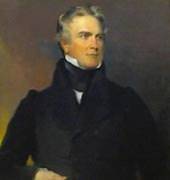Related Topics
Religious Philadelphia
William Penn wanted a colony with religious freedom. A considerable number, if not the majority, of American religious denominations were founded in this city. The main misconception about religious Philadelphia is that it is Quaker-dominated. But the broader misconception is that it is not Quaker-dominated.
Philadelphia People
New topic 2017-02-06 20:33:59 description
The Hogan Schism
These issues of controlling authority (ultimately quite parallel to the contrast between a monarchy and a republic) came to a head around 1820, when a charismatic Irish priest named William Hogan came to Philadelphia, and soon became the clear favorite of the trustees of the local church. There had previously been difficulty getting anyone to accept the contentious job of Bishop, but when Henry Conwell took the job, he soon decided that Hogan had to go. The trustees nevertheless supported Hogan, and it became necessary to appeal to Horace Binney,

|
| Horace Binney |
a non-catholic, to negotiate a solution. (Binney's son later became a founder of the Union League, and like his father was much respected for many civic accomplishments.) The outcome, unfavorable to Hogan, encouraged the Church to become much more forceful in exerting Vatican control over provincial churches, especially American ones.
So matters turned out one way for the Methodist-Episcopals and the opposite way for the Catholics. Each group now expresses satisfaction with the enduring effect on their system. However, it is clear that both top-down and bottom-up convictions are very unyielding, and are not confined to either religion or politics. Both philosophies are in fact seemingly resoundingly justified by occasional experiences, and therefore strongly persist to this day. Along the same lines, the election of bishops by the priesthood, and selection of the priests by the lay deacons are the central differences between the Church of England and the American Episcopalian Church. The evolved solution among the American Episcopalians has been the latitude to seek a "flying bishop" from somewhere else when the local bishop differs significantly from the viewpoints of some local parish. This has been a source of vigorous debate even recently, and even in the Philadelphia area.
While there is no need to stir up these dangerous embers, anyone who seeks to understand the issues which led to the American colonies going to war for independence from England, must understand this matter. Many historians would agree that the American Revolution was provoked by George III attempting to strengthen the monarchy at a moment in history when the colonists were seeking more local autonomy. All colonial institutions tended to reflect this central disagreement about autonomy in governance, but it is conceivable that the religious influenced the political more than the reverse. Tensions about authority were of course greatly magnified by the other notoriously strong religious dissensions of the Seventeenth and Eighteenth Century.
Originally published: Thursday, September 19, 1991; most-recently modified: Friday, May 31, 2019
| Posted by: Eddie Ward | Feb 23, 2014 11:46 AM |